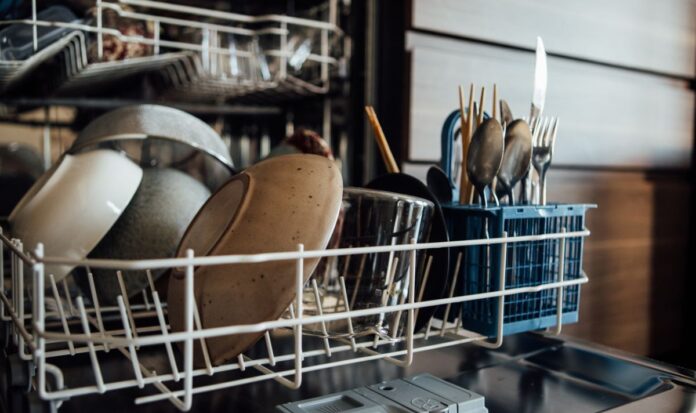With energy bills on the rise, the energy experts at Hometree have shared which home appliances use the most energy, and what households can do for cheaper alternatives. According to the experts, the majority of usage on energy bills comes from the wet household appliances, such as dishwashers and washing machines.The experts explained: ‘The average dishwasher cycle lasts around an hour and a half, but some lower quality ones can run from two to four hours. Running a dishwasher is one of the most expensive household appliances, using around 3.3 kWh of energy.’It’s possible to estimate how much energy each appliance uses by multiplying its power rating in kW by the number of minutes/hours it’s left on. Wattage information should be on the label or in any manual that comes with your appliance.’For example, a dishwasher may have a power rating of 2200W (there are 1000W in a kW). If you run it for 90 minutes it uses 3.3 kWh, costing around £1.12 for a 90 minute cycle. Here are the workings of the equation: 2.2 x 90/60 = 3.3kWh.’There are options for saving on your energy bills, such as making sure to only run the dishwasher when fully loaded, and investing in a grade A energy-efficient dishwasher. READ MORE: Stamp duty cut to end – Jeremy Hunt announces deadline for buyers 6 ‘most expensive’ household appliances ‘raking up’ your energy bills – how to save money (Image: Getty)’The good news is that dishwashers are more time efficient, and cheaper than washing dishes by hand, which tends to use more water.’2. Washing machineAccording to the experts, washing machines and dishwashers account for around 14 percent of a typical energy bill. On average, a washing machine will run from around 45 to 90 minutes every time it is run.The pros added: ‘A washing machine will have a similar power rating to a dishwasher, with an average rating of 2200W. Typically, though, the running cycle for a washing machine would be shorter, therefore costing less per cycle.’On an average 2200W washing machine, the appliance will use about 2.2kWh of energy if running for an hour, which will cost around 75p. DON’T MISS:Three gardening ‘mistakes’ which could decrease your house price [EXPERT]Six kitchen habit changes to make for ‘significant reduction’ in bills [COMMENT]Easy 40p ‘trick’ to freshen up pillows and banish odours completely [INSIGHT] Highest energy bills in the UK (Image: EXPRESS)’An air fryer is similar to an oven in the sense that it bakes and roasts. The main difference, however, is that the heating elements are only located on the top and are accompanied by a large, powerful fan. ‘The average air fryer wattage is 1kW, meaning that using an air fryer for around ten minutes would use up to around 0.16kWh of energy. This will cost around 5p on average, making it the most affordable way to cook.’5. Electrical appliancesElectrical appliances refers to items such as televisions, laptops and games consoles, which take up around six percent of an energy bill, according to Energy Saving Trust.According to the experts, a typical 50-inch plasma TV will have a power rating of around 300W, which will cost around 10p per house to use. The average laptop with a wattage rating of 50 will cost around 2p to use every hour.The experts added: ‘There are things you can do to cut costs when watching TV, such as turning the brightness down slightly, setting a sleep timer, and turning off the plug switch when not in use.’6. LightingThe Hometree experts continued: ‘Energy Saving Trust reports that lighting will cost around 5% of the average yearly energy bull. The average lightbulb will cost you around 2p per hour, using up 0.06 kWh of energy. This may not seem like much, but when you have several lightbulbs running all day, the numbers soon add up.’It may seem obvious, but making sure to switch light switches off when they are not in use could save as much as £25 a year in energy bills.Households could also invest in LED lighting, which is often brighter and more energy efficient. Switching out lightbulbs for LEDs could save around £15 per light bulb per year, according to the experts.
‘Most expensive’ household appliances ‘raking up’ your energy bills
Sourceexpress.co.uk
RELATED ARTICLES


